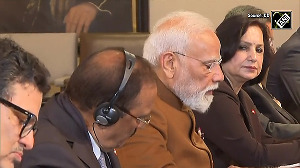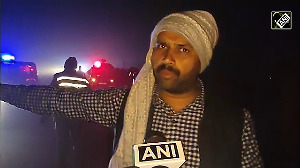America's nonproliferation lobby, which has been opposing the US-India civilian nuclear agreement tooth and nail, seems resigned to the fact that the India safeguards agreement is a shoo-in at the board of governors of the International Atomic Energy Agency, which is meeting today in Vienna.
The powerful lobby, however, has set its sights on persuading the 45-member Nuclear Suppliers Group to not endorse the deal.
At a press briefing at Washington DC's National Press Club on the eve of the IAEA board of governors meeting, nonproliferation experts called on the NSG not to reach a consensus on the accord, since it was 'seriously flawed and would undermine the professed objectives of the NSG'.
Daryl Kimball, executive director of the Arms Control Association under whose aegis the experts were gathered, and who has coordinated the nonproliferation lobby's efforts to torpedo the deal in US Congress, the IAEA and the NSG, said, "This is the time for NSG governments to stand up and be counted in order to prevent further damage to the nonproliferation system."
Sharon Squassoni, erstwhile analyst with the Congressional Research Service and now an associate at the Carnegie Endowment's Nonproliferation Center, said, "For India, the end game if the NSG decision. Once the NSG says yes, India will be free to go and get mostly what it needs in uranium for its reactors. India will be able to trade with other states and France and Russia are waiting in line to supply India with nuclear trade. So, that's the end game."
"There should be no rush to come to a decision," Kimball said. "The only reason the Bush Administration is pushing the NSG to meet in August and is hoping beyond hope that the US Congress will have time to consider the US-India 123 Agreement before its scheduled adjournment date of September 26 is that President Bush is going to be leaving the White House in early January of 2009 and he would like to have a nice Rose Garden ceremony capping off this endeavour.
"That's not a good reason for the Congress to rush ahead, for the Nuclear Suppliers Group to rush ahead or the IAEA board of governors to rush ahead," Kimball said.
Squassoni said the NSG "has some important considerations to think about," and argued that "it is in the US interests and US law to cut off nuclear trade with a State that tests nuclear weapons."
"But it's also in the NSG's interests and here's why," she said, "India freely admits that its nuclear weapons programme was borne of its civilian nuclear power programmes. It has said this in the most recent document that it gave to the IAEA."
Squassoni said that "India has insisted all along that any nuclear deal not impinge on its ability to conduct future nuclear tests even as it has promised to adhere to a unilateral test moratorium."
Ambassador Robert Gray, former US Representative to the Conference on Disarmament, said, "Basically what we are dealing with here is the United States has really given India a blank cheque to proceed to go around all of the safeguards agreement of the Nuclear Nonproliferation Treaty and other agencies and is now, it seems to me, we are trying to assist them in cashing that check at another bank -- the Nuclear Suppliers Group."
He said, "This is still another example and perhaps the most egregious example of this sort of foreign policy by unilateral fiat."
Seconding this, Squassoni also urged the restriction of sensitive nuclear technology transfers between NSG members and India, particularly those that would envisage uranium enrichment and spent fuel reprocessing. "India has such facilities but it has not placed them under international safeguards," Squassoni added.
Gray said while the Non-Proliferation Treaty had its faults and "is not a perfect agreement," it is foolhardy to "throw out a whole system that you've built up painfully over 30-40 years just on a whim because you want to establish some sort of a so-called strategic relationship with a country which has always been very good at protecting its own national interests and is not about to do anything in the international arena in the years to come that's going to make it an ally of the United States."
He argued that "the Indians have a very strong tradition of acting like the British -- they have no friends but they have permanent interests. I wish sometimes the United States would act like that."
Gray said, "It's possible the NSG may be convened by the end of August to discuss this but my conversations with many NSG governments suggest that the decision by the NSG is not going to be a quick or easy one. I think it is highly unlikely that the United States is able to obtain for India a so-called 'clean' and 'unconditional' exemption."
"There are some countries that still do believe in norms and standards -- I would say this is more than a dozen countries that are concerned about this nuclear testing issue, they are concerned about transfers of sensitive enrichment or processing technologies and there are other concerns," he added.





